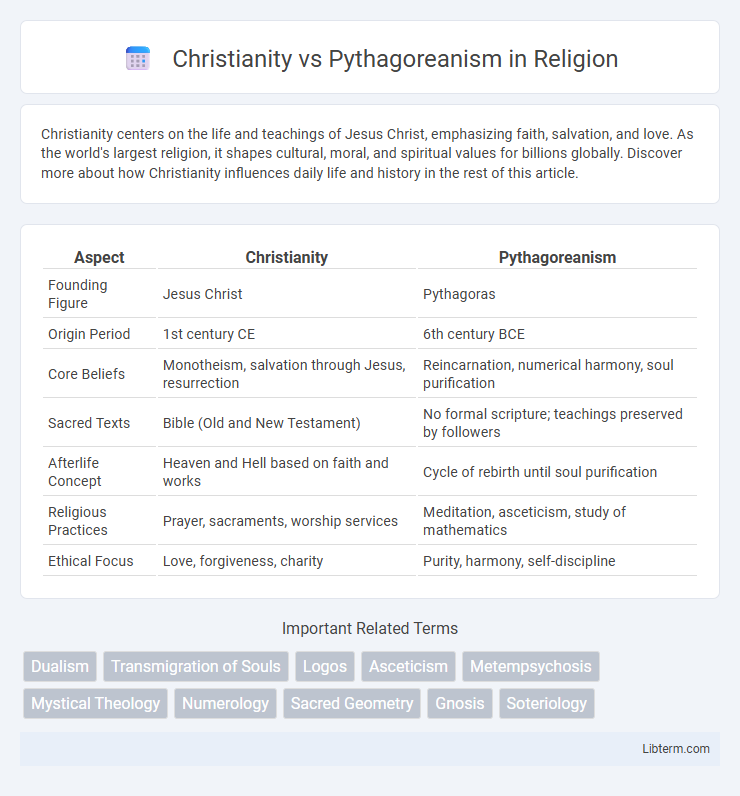Christianity centers on the life and teachings of Jesus Christ, emphasizing faith, salvation, and love. As the world's largest religion, it shapes cultural, moral, and spiritual values for billions globally. Discover more about how Christianity influences daily life and history in the rest of this article.
Table of Comparison
| Aspect | Christianity | Pythagoreanism |
|---|---|---|
| Founding Figure | Jesus Christ | Pythagoras |
| Origin Period | 1st century CE | 6th century BCE |
| Core Beliefs | Monotheism, salvation through Jesus, resurrection | Reincarnation, numerical harmony, soul purification |
| Sacred Texts | Bible (Old and New Testament) | No formal scripture; teachings preserved by followers |
| Afterlife Concept | Heaven and Hell based on faith and works | Cycle of rebirth until soul purification |
| Religious Practices | Prayer, sacraments, worship services | Meditation, asceticism, study of mathematics |
| Ethical Focus | Love, forgiveness, charity | Purity, harmony, self-discipline |
Origins and Historical Context
Christianity originated in the 1st century CE within the Roman province of Judea, rooted in Jewish traditions and centered on the life and teachings of Jesus of Nazareth. Pythagoreanism emerged in the 6th century BCE in Magna Graecia, founded by the philosopher Pythagoras, emphasizing mathematics, metaphysics, and the harmony of the cosmos. While Christianity developed as a monotheistic religion with ethical and salvific goals, Pythagoreanism combined religious practices with philosophical and scientific inquiry in ancient Greek culture.
Founding Figures and Key Influences
Christianity centers on Jesus Christ, whose teachings and resurrection form the foundation of its faith, heavily influenced by Jewish traditions and Greco-Roman culture. Pythagoreanism stems from Pythagoras, a philosopher and mathematician whose ideas about numbers, harmony, and metaphysics shaped early Greek philosophical thought. Both traditions integrate spiritual and moral principles but diverge in cosmology and epistemology, reflecting their unique historical and cultural origins.
Core Beliefs and Doctrines
Christianity centers on the belief in one God and the salvation through Jesus Christ, emphasizing doctrines like the Trinity, resurrection, and eternal life. Pythagoreanism focuses on mathematical harmony, reincarnation, and the soul's purification through knowledge and ethical living. While Christianity teaches divine grace and faith, Pythagoreanism prioritizes rational understanding and the metaphysical significance of numbers.
Views on the Divine and the Cosmos
Christianity views the Divine as a personal God who is both creator and sustainer of the cosmos, emphasizing a relational and moral framework grounded in scripture and the life of Jesus Christ. Pythagoreanism perceives the cosmos as an orderly, harmonious system governed by numerical relationships, where the divine manifests through mathematical principles and cosmic harmony. While Christianity centers on a transcendent God who interacts with creation, Pythagoreanism focuses on the immanent divine expressed through abstract, immutable laws underlying physical reality.
The Role of Mathematics and Mysticism
Christianity incorporates mysticism through symbolic interpretations of numbers, such as the Holy Trinity representing divine unity, while Pythagoreanism centers on mathematics as the foundation of cosmic harmony and spiritual truth. Pythagoreans viewed numbers and numerical relationships as the essence of all existence, blending mathematics with metaphysical beliefs, whereas Christianity often uses mathematical symbolism to express theological doctrines rather than as a primary metaphysical framework. Both traditions reveal a profound respect for numbers, though Pythagoreanism elevates mathematics to a mystical system governing reality, whereas Christianity applies it within a theological narrative.
Perspectives on the Soul and Afterlife
Christianity teaches the soul is immortal, created by God, and destined for eternal life in heaven or hell based on moral conduct and faith in Jesus Christ. Pythagoreanism views the soul as immortal but subject to reincarnation, cycling through multiple lives to achieve purification and eventual union with the divine. While Christianity emphasizes salvation and eternal judgment, Pythagoreanism focuses on spiritual evolution through successive incarnations.
Ethical Teachings and Moral Practices
Christianity emphasizes love, forgiveness, and compassion as core ethical teachings, advocating for moral practices such as charity, humility, and adherence to the Ten Commandments. Pythagoreanism centers on harmony, purity, and the pursuit of justice, promoting ethical practices like self-discipline, vegetarianism, and communal living to achieve spiritual and moral perfection. Both traditions underscore the importance of moral virtue but diverge in their metaphysical foundations and specific ethical applications.
Rituals, Worship, and Community Life
Christianity centers its rituals on sacraments such as baptism and the Eucharist, fostering communal worship experiences in churches that emphasize prayer, singing, and scripture reading. Pythagoreanism, an ancient philosophical and religious movement, practiced rituals including communal meals, silence, and music aimed at spiritual purification and harmony with cosmic principles. Both systems value community life, with Christianity emphasizing fellowship and mutual support among believers, while Pythagoreanism stresses disciplined living and philosophical contemplation within a close-knit, ascetic community.
Influence on Western Philosophy and Culture
Christianity and Pythagoreanism both profoundly shaped Western philosophy and culture, with Christianity influencing moral frameworks, ethics, and metaphysical concepts through its doctrines and teachings. Pythagoreanism contributed foundational ideas in mathematics, harmony, and the belief in the immortality of the soul, which permeated Platonic and Neoplatonic thought. Together, these traditions laid the groundwork for medieval scholasticism and Renaissance humanism, fostering a synthesis of spirituality, logic, and scientific inquiry.
Enduring Legacy and Modern Relevance
Christianity's enduring legacy is marked by its profound influence on Western culture, ethics, and law, shaping societal values for over two millennia. Pythagoreanism, though less dominant, contributed significantly to mathematics, philosophy, and the concept of harmony in science and music that persist in modern academic discourse. Both traditions maintain relevance today through their foundational principles in moral philosophy and scientific inquiry, impacting education, spirituality, and analytical thought worldwide.
Christianity Infographic

 libterm.com
libterm.com